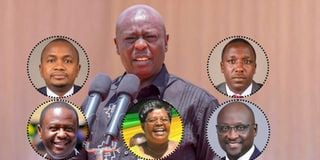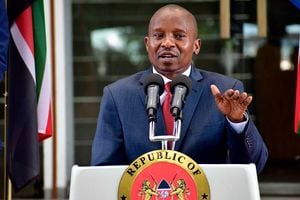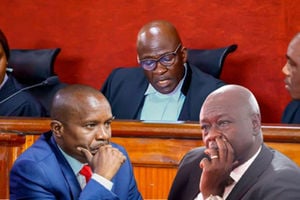
Deputy President Rigathi Gachagua and MPs (From top left) Wakili Edward Muriu (Gatanga), Chege Njuguna (Kandara), Mary Wamaua (Maragua), Wakili Edward Muriu (Gatanga) and Peter Kihungi (Kangema) .
Kiharu MP Ndindi Nyoro is among 13 lawmakers targeted for ejection from their influential committee leadership as President William Ruto’s Kenya Kwanza alliance and Raila Odinga’s Azimio cracks the whip against disloyalty, in the looming shakeup that will firm up their grip on Parliament.
The committee chairs targeted for removal are viewed as close allies of the impeached Deputy President Rigathi Gachagua.
Others have been accused of not appearing in the National Assembly on October 8, 2024 to vote in the impeachment motion against the DP contrary to their party position on the matter.
Sources within the President and Mr Odinga’s political circle have hinted that Azimio’s ODM MPs will benefit from the impending purge, including President Ruto’s allied MPs who were believed to have been sidelined.
Mr Nyoro chairs the powerful Budget and Appropriations Committee (BAC) that plays a critical role in approving budgetary allocations to various government Ministries, Departments and Agencies (MDAs).
Other than Mr Nyoro, the other committee chairs targeted in the bloodbath include the vocal Githunguri lawmaker Gathoni Wamuchomba (Constitutional Implementation and Oversight Committee), Ndia MP George Kariuki (Transport and Infrastructure) and tneir Embakasi North counterpart James Gakuya (Trade, Industry and Cooperatives).
Also targeted are Emurua Dikir MP Johanna Ngeno (Housing, Urban Development and Public Works), Mwala legislator Vincent Musyoka (Energy), Kipipiri MP Wanjiku Muhia (Regional Integration), Kitui East lawmaker Nimrod Mbai (Public Petitions) and Kareke Mbiuki of Maara (Tourism and Wildlife).
Leader of majority in the National Assembly Kimani Ichung’wah (Kikuyu), who chairs the Committee on Selection that is in charge of constituting the House committees did not respond to our inquiries sent to his known phone number.
However, Kimilili MP Didmus Barasa (UDA) was categorical that change, including reorganisation of committees is inevitable.
“The broad-based government that we now have must be reflected within the leadership of the House committees. It is because of this that the committees will be reorganised,” Mr Barasa, the vice chairperson of the Transport committee said.
The committees on budget, energy, transport, housing and trade are some of the most sought after by members ordinarily at the start of the first session of the House, usually after a General Election.
The Kimilili MP revealed that the planned reorganisation of the House committees was informed by the recently concluded National Assembly leadership retreat in Naivasha “that assessed performance of among others, committees”.
“It has been two years now and the House hasn’t reorganised its committees. As part of reengineering the National Assembly to ensure that it delivers services to the people, this change is necessary and as a House we will support it regardless of the likelihood of casualties,” he said.
Mr Barasa noted that the same way the judiciary transfers judges and the executive does the same for its officers as part of bringing change for delivery, the same also applies to Parliament.
The Kiharu MP, serving his second term, was widely viewed as too influential owing to his closeness to the President until doubts started emerging recently with his loyalty in question after he failed to take a position on the Gachagua impeachment as the matter raged.
Mr Nyoro was not in the House to either debate or vote on the impeachment, raising questions about his loyalty to President Ruto given that he was once touted as Gachagua’s potential replacement.
Murang’a County Woman MP Betty Maina noted that she is among MPs who abandoned Mr Nyoro for failing to take a position on the Gachagua impeachment.
Ms Wamuchomba fell out with President Ruto’s administration in the first year of assuming power and has since been a marked person by those close to the President.
Just like Ms Muhia, Ms Wamuchomba was among those who opposed and questioned the impeachment of DP Gachagua.
Mr Gakuya is a key ally of the impeached DP and has on numerous occasions clashed with the authorities leading to his arrest.
Standing Order 178 of the National Assembly Standing Orders provides guidance on the leadership of the House Committees for instance, departmental committees elect their chairpersons and vice chairpersons from among their respective members.
This means that any member of the respective departmental committee, whether from a parliamentary party forming the government or not, can chair or deputise the committees.
However, the Standing Order is specific on who chairs or deputises the Public Accounts Committee (PAC), the Public Investments Committees (PICs) and the Committee on Implementation (CoI).
The Standing Order states that members of PAC, PICs and SFAC shall elect a Chairperson and Vice-Chairperson from amongst the members of the committees from a party other than a parliamentary party forming the national government.
It goes on to state that the members of the Special Fund Accounts Committee (SFAC) shall elect a Chairperson and Vice-Chairperson from amongst independent members nominated to the committee or the members of the committee nominated from a party other than a parliamentary party forming the national government.
This is if there are no independent members in the House.










